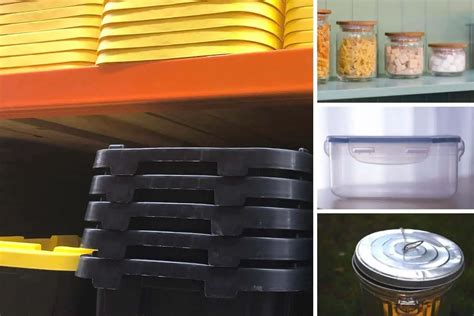can mice chew through sheet metal Mice cannot chew through materials like properly cured concrete, sheet metal, brick, copper, steel wool, and glass. These materials are resistant to their strong, sharp teeth and can be used to protect your home from a mouse .
Steel-cased ammo is metallic cartridge ammunition that uses steel shell casings instead of the more popular brass casings. While often associated with Russian ammunition, multiple .
0 · metal storage containers for mice
1 · metal mouse proof storage containers
2 · materials mice cannot chew through
3 · can rodents chew through metal
4 · can rats chew through plexiglass
5 · can mice get into totes
6 · best rodent proof storage containers
7 · best mouse proof storage containers
Black boxes are shot from cannons, stabbed by thin steel rods, attached to 500 lb (227 kg) weights and dropped from 10 ft (3 m) above the ground, crushed in a vice at 5,000 lb (2,270 kg) of pressure, cooked with a blow torch for an hour at .
What Can’t Mice Chew Through? Concrete. Concrete that has been properly cured is mouse-proof! However, old or brittle concrete could be broken down by a determined .
Metal tends to be smooth and sturdy, making it effectively impossible for a mouse to sink its teeth in. Two of the best metals are iron and stainless steel, although even soft metals such as copper can prove an excellent barrier. Aluminum is a .
metal storage containers for mice
metal mouse proof storage containers
What Can Mice Not Chew Through? Mice cannot chew through flat, hard surfaces due to the inward curve of their teeth. However, they can chew through wood, plastic, vinyl, . Mice and rats cannot chew through stainless steel mesh. Stainless steel mesh with a hole diameter of 1mm or less will keep mice and rats from chewing through it as it will be difficult for the rodents to get their teeth around . Mice can chew through softer metals like aluminum and thin sheet metal, but not most metal materials. Mice can enter through small cracks or holes in concrete and brickwork. . Mice cannot chew through materials like properly cured concrete, sheet metal, brick, copper, steel wool, and glass. These materials are resistant to their strong, sharp teeth and can be used to protect your home from a mouse .
A mouse can chew through wood, plastic, soft vinyl, rubber and even low gauge aluminum or fiberglass-based screening. What Can Mice Not Chew Through? Mice teeth have an inward curve that limits the pests' ability to gnaw through . However, there are some materials that mice cannot easily chew through, such as steel wool, glass, and concrete. These materials are harder and denser than the other . They can even get through softer metals like aluminum sheeting, lead, copper, iron, and gold. That means you shouldn’t try to keep rats out of your home with gold! Since they can chew through softer metals, they can definitely . Generally, mice cannot chew through most metal materials. They have strong teeth, but metal is simply too tough for their tiny chompers. However, mice are persistent, and they can easily gnaw through softer metals like aluminum and thin sheet metal.
What Can’t Mice Chew Through? Concrete. Concrete that has been properly cured is mouse-proof! However, old or brittle concrete could be broken down by a determined mouse. Concrete is a great material for patching large cracks or openings near the ground. Sheet Metal. Sheet metal is another great, mouse-proof way to patch up large openings. BrickMetal tends to be smooth and sturdy, making it effectively impossible for a mouse to sink its teeth in. Two of the best metals are iron and stainless steel, although even soft metals such as copper can prove an excellent barrier. Aluminum is a bit of a mixed bag, as thinner gauges can be gnawed through while thicker gauges cannot. What Can Mice Not Chew Through? Mice cannot chew through flat, hard surfaces due to the inward curve of their teeth. However, they can chew through wood, plastic, vinyl, rubber, aluminum, fiberglass-based screening, soft vinyl, and low gauge aluminum.
Mice and rats cannot chew through stainless steel mesh. Stainless steel mesh with a hole diameter of 1mm or less will keep mice and rats from chewing through it as it will be difficult for the rodents to get their teeth around the mesh as long as the mesh quality is good. Mice can chew through softer metals like aluminum and thin sheet metal, but not most metal materials. Mice can enter through small cracks or holes in concrete and brickwork. Sealing entry points with sturdy materials like metal mesh, steel wool, or metal sheeting can prevent mice from invading. Mice cannot chew through materials like properly cured concrete, sheet metal, brick, copper, steel wool, and glass. These materials are resistant to their strong, sharp teeth and can be used to protect your home from a mouse invasion.
A mouse can chew through wood, plastic, soft vinyl, rubber and even low gauge aluminum or fiberglass-based screening. What Can Mice Not Chew Through? Mice teeth have an inward curve that limits the pests' ability to gnaw through flat, hard surfaces. However, there are some materials that mice cannot easily chew through, such as steel wool, glass, and concrete. These materials are harder and denser than the other materials that mice typically encounter, making it difficult for them to gnaw through these surfaces.
materials mice cannot chew through


can rodents chew through metal

can rats chew through plexiglass
can mice get into totes
best rodent proof storage containers
Water supply pipes used to transport potable drinking water in a home plumbing system use different materials than those used for the pipes carrying drain water. The materials used vary from metals like steel or copper to plastic derivatives like PVC, CPVC, and PEX.
can mice chew through sheet metal|best mouse proof storage containers